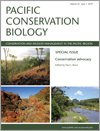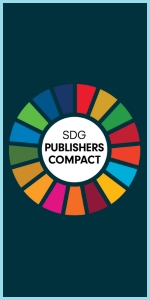
Pacific Conservation Biology
Volume 25 Number 1 2019
Conservation Advocacy
PCv25n1_OBTribute to David William Goodall DSc, AM: advocate and ecologist par excellence (4 April 1914 to 10 May 2018)
PC17018Nature conservation in a brave new (post-truth) world: arguments for and against public advocacy by conservation biologists
Whether conservation biologists should engage in advocacy has been a controversial topic for many years. I argue that conservation biologists should acknowledge their primary responsibility in a civil society as informed citizens possessing specialised knowledge and should aim to influence conservation policy through a variety of communication channels.
PC17025Values, credibility, and ethics: public advocacy and conservation science
Conservation scientists need to be public advocates for creating economies that are ecologically sustainable. In addition, they must assume a role of leadership in the development of global environmental policies and the creation of a world where all species share the Earth’s resources. At present that world does not exist.
PC17014The reverse precautionary principle: science, the environment and the salmon aquaculture industry in Macquarie Harbour, Tasmania, Australia
Benthic waters of Macquarie Harbour, Tasmania de-oxygenated as fish production grew. The reverse precautionary response was to undertake further research because the causes of the changes were not fully understood. To help avoid such a response, research on the environmental impacts of an industry needs to be undertaken by scientists in secure positions funded independently of industry and government.
This opinion piece explains the importance of taxonomy and why it is critical to actually identify species. However, the ability to be able to do this is declining here in Australia and we desperately need to rectify this situation. We taxonomists need to become better advocates for our discipline and better explain to our colleagues and the general public why taxonomy is useful. We need to develop illustrated guides and develop online guides, with websites that are widely marketed and can be useful for other scientists as well as the general public.
PC17036Dingo singing: the howl of the advocate
Advocacy in World Heritage protected areas is challenging traditional management. Contextualised analysis compared advocacy on behalf of the K’gari-Fraser Island dingo in the management community with the research community. Advocacy in scientific discussion is crucial for negotiation to achieve conservation outcomes acceptable to managers in a World Heritage context.
PC18058The contest for the tall forests of south-western Australia and the discourses of advocates
 , Angela Wardell-Johnson
, Angela Wardell-Johnson  , Beth Schultz, Joe Dortch, Todd Robinson, Len Collard and Michael Calver
, Beth Schultz, Joe Dortch, Todd Robinson, Len Collard and Michael Calver
By analysing a cross section of 118 statements published over 187 years, we differentiate seven discourses to describe the history of forest management in the tall forests of south-western Australia. Management for a more comprehensive set of values would acknowledge a new moral consensus.
This essay is a zoologist’s response to Zoopolis. A political theory of animal rights. A point of agreement is that animals deserve more than being over-ridden by human interests. A stalling point is the animal rights agenda, which rules out animal research as morally illegitimate.
PC17022The defamatory potential of ad hominem criticism: guidance for advocacy in public forums
Conservation biologists should evaluate the defamatory potential of proposed ad hominem criticisms and ensure that criticisms are made for a proper purpose, have an adequate factual grounding, and are formulated as a statement of opinion if the truth of the allegations would be difficult to prove in court.
PC17022 Abstract | PC17022 Full Text | PC17022PDF (204 KB) Open Access Article
Some scientists who engage in public advocacy come under attack. It is worthwhile preparing by learning about the risks, increasing financial security and building networks for personal support. When under attack, it is important to document actions, seek advice and mobilise support. Supporting outspoken scientists protects scientific freedom for all.
PC17048Retraction notice to ‘Watching the tide roll away – advocacy and the obfuscation of evidence.’ [Pacific Conservation Biology (2018) doi:10.1071/PC17048]
PC17048Retraction (443 KB) Open Access Article



